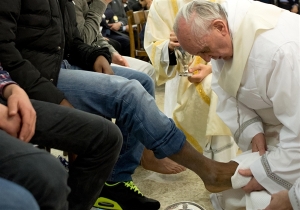The recent election of Pope Francis has been stirring up all kinds of buzz. One of the more interesting streams of conversation centers around the pontiff’s inclination to buck traditions in order to identify more readily with the common people and the socially marginalized. I was personally very moved to hear that Francis decided to celebrate the Evening Mass of the Lord’s Supper on Holy Thursday, not at St. Peter’s Basilica, but in a Roman juvenile prison. As part of the evening service, in an inspiring show of papal humility, Francis stooped down to wash the feet of 12 of the juvenile inmates, recalling the way Jesus himself washed the feet of his disciples in the upper room the night of his betrayal.

Photo courtesy of the Osservatore Romano
No one is terribly surprised that Francis would do this, of course. His track record in Buenos Aires demonstrates that he routinely celebrates the Holy Thursday Mass among the least, the last, and the lost of society. But it does reveal that becoming Pope has done little to diminish Bergoglio’s sense of identity with those Jesus called us to serve. It sets an exciting precedent for the future of the Roman Catholic Church under Francis’ leadership.
While I do not personally support the full dogma of the Roman church, I do nevertheless support that segment of evangelicals who embrace fellowship with Catholics as members of the orthodox body of Christ universal (which, after all, is the real meaning of catholicity in the first place). We may not agree on matters of Marian devotion, papal infallibility, or sacramental theology; but I, for one, am proud to claim as my brother in Christ a Christian of any denominational stripe who courageously leads by Christ’s own example.
Having been at one time in my life where these inmates are now, I can say without hesitation that Francis’ example made a powerful impact upon young souls this past Thursday. Some of those inmates whose feet he washed during the Mass will leave that Roman prison transformed by the Holy Spirit, inspired by Francis’ example, motivated to serve others in the same way they themselves have been served. As we each celebrate Easter in our own ways this year, let’s remember that Jesus’ resurrection represents triumph not only over death itself, but over all the societal institutions that indicate sin continues to reign in a world still awaiting final redemption. The empty tomb reminds us that one day there will be no more need for prisons, just as surely as there will be no more need for graves.
